How far does the right to representation extend? Concerns over reputation, ethics, morality and regulation are giving firms more reason than ever to turn away or shed clients
AT THE TABLE
(Back row) Andrew Pavlovic CM Murray; Francis Dingwall Legal Risk; Sheona Wood DWF; Chris Green Xapien; Iain Wilson Brett Wilson; (front row) Fiona Pearson Michelmores; Emma Williams Simpson Thacher & Bartlett; Julie Norris Kingsley Napley; Lubna Shuja Law Society; Reshma Raja RPC; Jonathan Sewell Payne Hicks Beach; Eduardo Reyes Law Society Gazette
Attending remotely: David Hunter Bates Wells
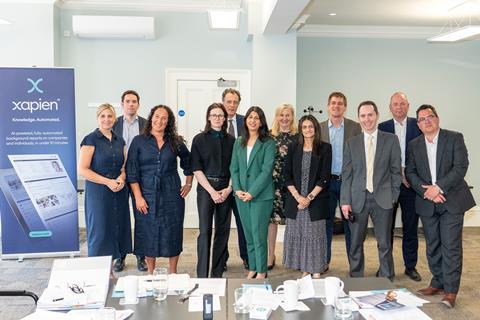
The headline sounds like a lurid hypothetical outcome used to get the attention of bored lawyers at a mandatory training session. But it is not. ‘Wagner mercenary chief got around UK money laundering checks by submitting his 81-year-old mother’s gas bill,’ was a Daily Mail headline from February this year.
The Mail continued: ‘Wagner boss Yevgeny Prigozhin was under UK, EU and US sanctions in 2021 when British law firm Discreet Law requested identification documents from him as part of anti-money laundering checks before taking him on as a client… Prigozhin’s Russian lawyers responded by sending the London-based law firm a picture of his passport along with a gas bill listed to the mercenary chief’s then 81-year-old mother.’
The Financial Times had broken the story, based on leaked emails, but it was reported far beyond the FT’s core business readership. It was a regulatory compliance and client due diligence story that became a war story.
As Emma Williams, director of risk and compliance at Simpson Thacher & Bartlett, notes: ‘One quick Google search would have identified that he was Putin’s right-hand man. They call him one of the worst warlords in Russia. He was on the FBI’s most-wanted international list; UK, EU and US sanctions lists.’
Prigozhin had instructed Discreet Law in 2021 in a libel action against Eliot Higgins, founder of investigative news service Bellingcat, over tweets Higgins had posted about the Wagner Group. In fact, Discreet Law had withdrawn its services two months before the proceedings were struck out in the High Court in May last year.
Some of the damage was generalised beyond the poor publicity Discreet Law received. Senior Labour MP Margaret Hodge said the episode showed there was an ‘urgent need for reform’. Does Hodge have a point?
‘One of the things we do is AML audits for firms… to check whether they are meeting their obligations,’ Legal Risk partner Francis Dingwall responds. ‘I would say one of the things that I see is a real lack of curiosity about clients. And it’s quite surprising, really, because in normal life now, when you come across somebody, you immediately put their name in [to a search engine]; you probably see them on LinkedIn… You can find out all sorts of interesting stuff.’
To what does he ascribe this lack of curiosity? ‘I guess the fee-earners are thinking, “My job is just to do the conveyancing”.’ But Dingwall continues: ‘To provide a good service to your client… the more you know about them the better. To build a relationship with the client going forward you want to know as much as you can – quite apart from worrying about how sinister they might be.’
Iain Wilson, partner at niche regulation and reputation firm Brett Wilson, says his firm’s own processes aim at ‘overemphasising the point that if [our lawyers have] any concerns, even if they think they’re being overly cautious, we have a sanctions committee that also deals with [money laundering regulations]’. The committee consists of Wilson, another partner and a practice administrator. ‘We just have a chat about it and put heads together,’ he says. This leads him to ask of other firms: ‘Where staff members aren’t following protocols and they’re clearly not doing their due diligence, are law firms disciplining them? If not, should they be? Is that what we should be doing?’
And why take the risk of being insufficiently curious about a client? ‘This is obviously not an issue in our firm,’ Payne Hicks Beach partner Jonathan Sewell says, ‘but I think a lot of the problem elsewhere might be that people are driven by pressure to bill. This is non-chargeable work. It’s just not attractive in that sense.’
And to Hodge’s point on the need for reform, Kingsley Napley partner Julie Norris, who specialises in professional regulation, says: ‘I wonder if part of the reason that lawyers might not focus on this as much as they plainly ought to is because the seriousness of shortcomings isn’t reflected in what happens at the SRA and the SDT. There’s no translation in my view. I know personally [a figure like] £20,000 would be a lot, but really it’s minute by way of a fine, isn’t it?’
Yevgeny Prigozhin is a fairly extreme example of a client a firm should reject instructions from. A simple search on Google may be less effective for others. Xapien, sponsor of the roundtable, is an artificial intelligence company which builds software that conducts background checks on people. Chief executive Chris Green says: ‘We talk a lot about clients when they’re dealing with third parties.’
Often, the question the client needs an answer to is not, ‘can we?’, Green says, but, ‘should we?’. He adds: ‘The context here is the ethics of representing someone [for example, based on their] ESG considerations… Google is not going to get it done. It’s better than nothing, but you end up with multiple tabs open at the top of your screen. You need automated research.’
Williams endorses Green’s view that the knowledge gained may also be of commercial advantage – client due diligence being about more than seeking a simple green or red light on acting for a client. Such intelligence, she tells fee-earners, ‘is going to help you with your elevator pitch, your [business development], knowing who’s related to who’.
Values
Law firms are aware that clients, the public, campaigning organisations, their own people and the media may take a view on who they represent. This has led many to make declarations of intent on ethical issues, to clearly state their values, and to report on commitments they have made in areas like the environment.
Bates Wells, senior counsel David Hunter’s firm, is now accredited as a ‘B Corp’ business – a firm that is ‘purpose-driven’. B Corps are profit-making firms that voluntarily meet heightened standards of social and environmental performance and accountability (see Gazette, 14 April 2023, tinyurl.com/mtbbvbf8).
‘We’re committed to trying to deliver positive social impact,’ Hunter explains. The firm recently reflected on the meaning of that status in the context of who the firm acts for, and on what matters. ‘If we are holding ourselves out for positive impact, it’s inconsistent to then be acting on matters that potentially have quite a significant negative impact,’ he says. ‘We’re getting there and it’s becoming more and more salient for us.’
Many law firms state their values. But, it is noted, successfully working according to values links to law firm culture. ‘Culture eats strategy for breakfast,’ RPC’s general counsel Reshma Raja points out. Values, clearly, could also be on the same menu. ‘They’re very interlinked with the firm’s culture… if you get the values and the culture right you’ve got a good brand.
‘I think the new generation coming into the legal profession absolutely want this… they want to work for somewhere that has got the values right, and it starts at the top and filters all the way down. So [values] are important but I think they’re definitely more than a set of words on a piece of paper. They have to be lived and breathed throughout the organisation.’
In that context, DWF partner Sheona Wood says: ‘I think the culture and structure of law firms will change – but driven by young people and this war on talent.’
She adds that the ‘dominance of one individual’ is a common factor in many firms that fail to live up to their stated values. She refers to the archetypal ‘big biller’ who is ‘allowed to behave as they want, and do the work they want with the clients, because they just keep bringing in the money’.
While clients and cases can reflect badly on a law firm’s public profile, there are professional principles that need to, and should, be adhered to. Legal ethics are not a perfect match for society’s ethics, Dingwall points out, and as a result should receive more attention from the legal profession in England and Wales.
AI: doing your thinking?
There are infamous examples of lawyers and law firms failing to do basic, commonsense checks on clients. Law firm Discreet Law could have identified Yevgeny Prigozhin as head of the mercenary Wagner Group with a simple Google search. Prigozhin is sanctioned and, in the US and elsewhere, a wanted man.
Many client checks are less straightforward. ‘Search engines are great if you want to retrieve a piece of information,’ Xapien’s Chris Green (pictured) says. What artificial intelligence makes possible is ‘a research engine’, which is something beyond a ‘search engine’. ‘That’s higher order capability,’ he says.

‘We’ve developed something that is a business application… something that will reference everything, which is critical if you’re going to use something for a compliance application. You need to be able to say where it got the information.’
AI, he adds, ‘will become increasingly capable’. It will be an aid to decision-making, but cannot replace decision-making, Green warns: ‘There is a risk for any firm in outsourcing your decision process to AI. You can’t outsource your legal obligation to anyone else, you certainly can’t outsource it to a machine, but actually machines can do a lot of the heavy lifting to serve up information for people to make a decision.’
In terms of AI’s development, ‘I think it’s going to move incredibly quickly’, Green says. ‘The questions when onboarding clients are becoming increasingly nuanced. And firms are being held to account because of their reputation [based on] who they work for. And so, it feels like we need a step change.
‘No one was delighted with their client onboarding process anyway,’ he adds. ‘I’ve not heard anyone in financial services ever say, “Oh, yes, absolutely nailed it”.’
Atticus Finch
‘The reason, historically, why American lawyers focus on ethics and have mandatory training is because in the light of “Watergate” it was found that there were 29 lawyers involved,’ Dingwall relates. ‘The US profession took a long, hard look at itself. Among other things, they required ethics training to be an integral part of lawyers’ work. And I think that does contrast with [England and Wales], where there is, possibly, a complacency – a perception that it’s just the Code of Conduct that matters.’
This, he says, means answering the question, ‘what is the lawyer’s role in society?’. What has arisen in US thinking on legal ethics, Dingwall continues, is a ‘standard conception’. ‘The lawyer must be neutral and so mustn’t take a position on their client’s morality, because you’re not there as their moral tutor, you’re there as their lawyer… You must be partisan, you must represent them zealously and… you’re not accountable for when things go wrong, so if you represent a murderer, and he’s acquitted and he kills again that is not the lawyer’s fault.’
That framework works most clearly in the context of criminal justice. Dingwall references Harper Lee’s fictional lawyer Atticus Finch, whose fearless defence of a black man accused of raping a white woman puts him the wrong side of public opinion. Finch faces down a lynch mob (albeit aided by his young daughter, Scout). One would hope that in a situation like this all lawyers would prove impervious to external pressure.
That is not just a moral point, but clearly a professional one. I point out that this is borne out by Lee’s sequel to To Kill A Mockingbird, Go Set A Watchman. In the latter, set years later when Scout is an adult, Finch turns out to be a segregationist who attends Klan meetings. He is not being the good man many fans of his persona in To Kill A Mockingbird believe him to be. But in the case which is the focus of the latter book, he is being a good lawyer, showing total commitment to his professional duties and to his client.
The ‘right to representation’ may not have an easy read-across to transactional advice. But turning to commercial litigation, Dingwall points out: ‘Lawyers do have a function in society and an important function which is kind of overlooked… I think one of the issues that lawyers should be thinking about is that their opponent’s properly represented or, if their opponent isn’t properly represented, that the practice and procedure of law is simplified so they can be.’
He continues: ‘Take the analogy of insurance. It’s not only good drivers who can get insurance. Your “boy racer” can get insurance from a specialist insurer who knows all about those risks. And likewise, you do already see in the City of London some firms will act for highly controversial clients. It doesn’t mean they’re a bad firm, it means that they’re a firm who know the business of acting for controversial clients.’
Michelmores partner Fiona Pearson says there are still ethical questions to answer here. She recalls, until last year, ‘oligarchs… working their way down’ a list of hundreds of law firms ‘until they found one’ which would act for them. In this context, client acceptance is ‘about having that moral compass, and I guess ethical compass, as a law firm’.
The issue of identifying lawyers with their clients was in the spotlight last year, when Conservative MP Bob Seely named in parliament four ‘amoral’ lawyers who he alleged acted for Putin ‘henchmen’ to silence rivals and critics. ‘Their amorality is going to bite their reputations in a way that will be uncomfortable,’ Seely said.
‘That raises its own issue though, doesn’t it?’ CM Murray partner Andrew Pavlovic, whose firm advises professional firms, says. These firms were named, he notes, ‘seemingly because they’ve been involved in certain types of work, rather than any actual evidence of them doing anything wrong’.
In general, Law Society president Lubna Shuja stresses: ‘A lawyer should not be associated with their client.’
Central control
The increased duty and pressure to scrutinise clients and instructions, for reasons of reputation, morality and compliance, has led to the growth in larger firms of specialised compliance, and client due diligence and ‘onboarding’ functions.
Professionalising those processes has benefits, given the increasingly specialised nature of the checks needed. But is there a downside?
Norris explains: ‘Where Big Law has moved towards centralised onboarding, what you’re actually seeing in reality is an increasingly deskilled cohort of lawyers who have a really remote understanding… of the realities of what client due diligence is, beyond the mere tick-box.’ The danger, she makes clear, is that individual lawyers think: ‘The client’s been onboarded, it’s all fine.’
As a result, Norris notes: ‘The lack of understanding among lawyers, juniors and partners, about anti-money laundering, what the Money Laundering Regulations and [Legal Sector Affinity Group guidance] require, is much underestimated, and it’s vast.’ Pearson cites the experience of instilling the importance of client due diligence in a new recruit, who at a previous firm had such processes ‘packaged up’ for them, despite having higher-risk categories of client.
Centralising processes, she adds, ‘frees up fee-earner time and you get a measure of consistency, but you also get an increase in your deskill’.
As a result, Raja notes, ‘we’re trying really, really hard with face-to-face training’, as online training lacks the impact for this topic. Williams concurs, noting that for lawyers: ‘One – you can’t delegate your ethical responsibility. And two – you can’t subcontract your criminal liability. That does tend to focus the mind, and I do exactly as you do, in terms of face-to-face training.’
Shuja concludes: ‘I actually think there are probably better levels [of knowledge] within sole practitioner firms, simply because you can’t delegate this to somebody [else].’
Photographs by Noah Da Costa
This roundtable discussion was kindly sponsored by Xapien


























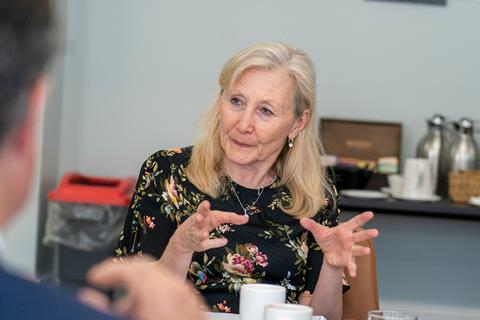
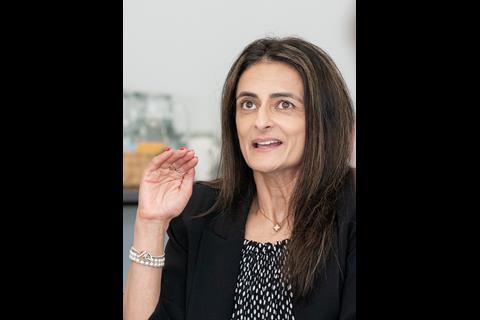
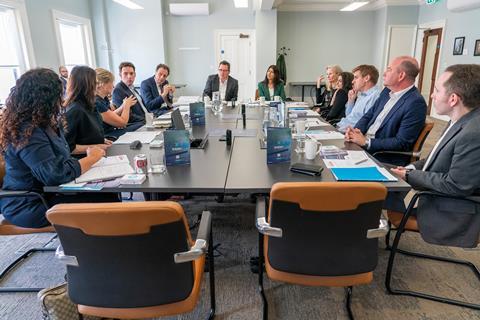
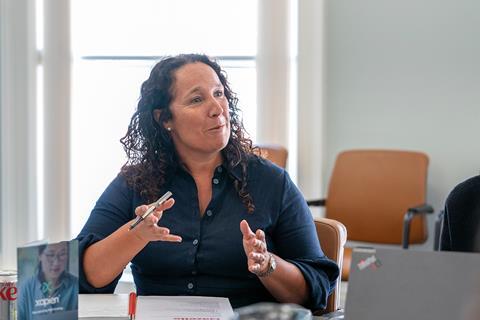
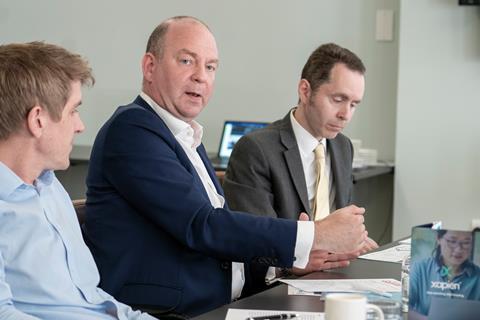















6 Readers' comments